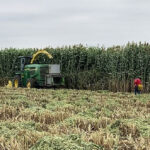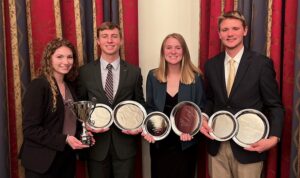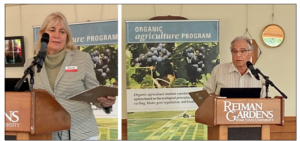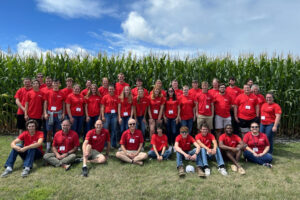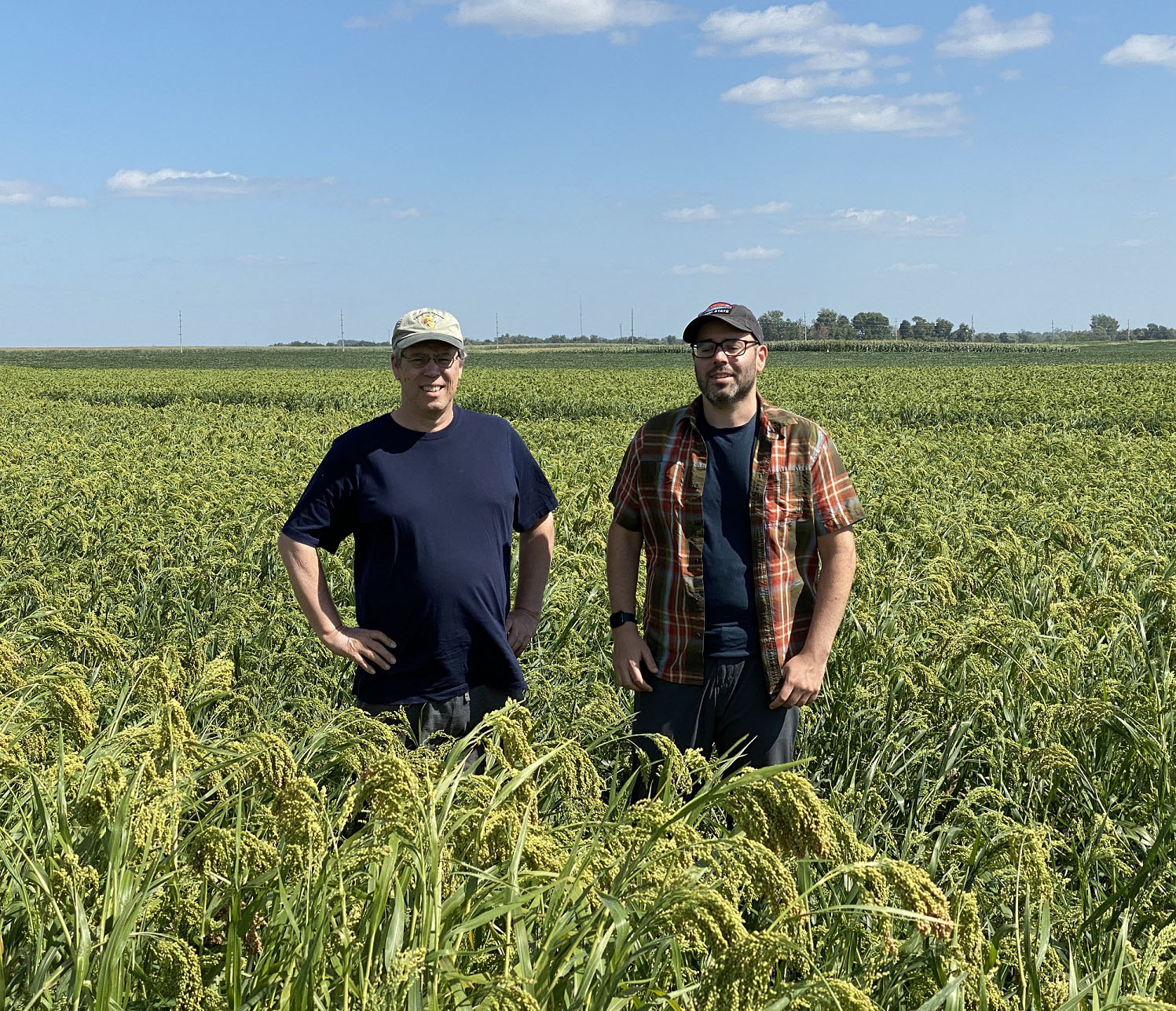
Ames, IA — The Food and Agriculture Organization of the United Nations has declared 2023 as the International Year of Millets, but these crops are unfamiliar to many Iowa farmers.
Expect that to change soon say plant-breeding father and son team Patrick and James Schnable, co-founders of the Ames-based company Dryland Genetics. They think proso millet (Panicum milaceum) can make midwestern agriculture more resilient and more profitable.
Proso millet is a hardy cereal grain that requires about half the water corn needs per bushel of grain produced. Its management is similar to corn, although it can be grown in the Midwest without the need to apply expensive nitrogen fertilizer. Farmers can use the same equipment they already use to plant and harvest corn or beans. Proso millet’s short growing season and late planting date means the crop could mesh well with rotations that include a winter annual crop, such as winter canola, camelina or winter peas.
Currently, proso millet is often sold in the U.S. as bird seed and in gluten free health foods. It can substitute for most of the uses of corn, including as feed for livestock and ethanol production. Millet also has a low carbon score, making it a crop that could qualify for incentives from industry and agencies seeking greenhouse gas reduction credits.
Proso millet is already grown on hundreds of thousands of acres in the U.S., yet it hasn’t become widely popular. For comparison, corn is grown on about 90 million acres each year.
“In large part, that’s because there has been little work to improve millet, which has not historically been a highly productive plant per acre,” said Patrick Schnable. “It has taken huge investments and almost 100 years of breeding to make corn the crop so many across the globe depend on today. Yet as corn yields rise, so do its water demands. As access to water becomes more limited in the future, we expect demand for a water-thrifty crop like proso millet to increase.”
A plant that can tolerate neglect
Patrick Schnable is the Iowa Corn Endowed Chair in Genetics and director of the Plant Sciences Institute at Iowa State University. His son, James, is the Charles O. Gardner Professor of Agronomy at the University of Nebraska-Lincoln. As plant scientists with extensive expertise in corn genetics, they both have interest in other promising crops.
The idea that became Dryland Genetics was originally born in 2013 when James was running an experiment with more than a dozen grains. After the test was over, he forgot about the plants, and they were left in the greenhouse with no one to water them. Everything died — except for the millet. “It was exciting to see that a crop could tolerate that level of neglect,” James Schnable said.
Then and there, they were inspired to create a start-up. In the decade since, they have been using their expertise to improve proso millet yields through genotyping and breeding. They have been testing the plants’ viability under different growing conditions and building markets for the best performing varieties.

Startup help
Patrick and James had both had some successes with other plant breeding businesses. They had also managed large grants from federal agencies and industry. Such experience helped them secure investments in Dryland Genetics from important investors, initially led by the private Ames Seed Capital group, and later, from the Iowa-based firm Next Level Ventures and the seed company run by Iowa’s only billionaire, Harry Stine. The Schnables also sought help from Iowa State resources, including the Iowa State Research Park south of the university, where Dryland Genetics is located.
“We looked at other places as a home for our company, but it was going to be challenging to find the space that would fit our needs,” James Schnable said. “The Research Park staff worked with us to help customize a space and a lease that would work and could change as we grew.”
“Iowa State encourages public-private partnerships and can provide important consulting help to fledgling businesses,” said Patrick Schnable, referencing ISU’s Digital & Precision Ag Economic Development Platform. “Iowa State is also one of small number of universities in the United States still investing in cutting-edge plant breeding,” he said. “This human capital makes Iowa State a great place to work on quantitative genetics and breeding, whether for corn or other crops.”
On-farm investor
Jeff Taylor, one of the early investors in Dryland Genetics, is now its board chair. He is also one of the farmer partners growing the company’s millet to produce seed for trials and early sales.
An Iowa State alumnus in agricultural studies, Taylor owns and manages his fifth-generation family farm north of Ames. Last year he grew 35 acres of millet. This year, he’s expanded the acreage devoted to the crop.
“Proso millet has been easy to grow so far, and last year, our new varieties had record yields,” Taylor said. “It’s a short season crop that fits in well with our current cropping system. It doesn’t need much tillage, water or fertilizer, and it uses equipment we already have. It emerges fast and quickly shades out competition between the rows.”
Taylor credits help he has received through Iowa State’s BioCentury Research Farm, especially from Levi Powell, manager of research, and Ben Covington, research scientist. “Their experience and depth of technical knowledge of machinery helped make sure each seed was planted properly this spring,” Taylor said.
“I’ve been looking for ways to make my farm more diversified, and I think this has real potential as a high-value crop for the future,” he said. “It has so many uses, including for human consumption and for livestock feed. It’s gluten free. Research shows that it could be a good grain to blend in ethanol, and it could be eligible for payments through emerging carbon markets.”
One of the biggest challenges is getting millet better integrated into the country’s crop insurance programs – a big influence on farmers’ decisions about what to grow, according to Taylor.
“Proso millet is already being grown in the U.S., and there’s growing interest in areas facing water shortages,” he said. “It’s not a new crop. We’re just making it better.”
More grain, less water
Dryland Genetics’ mission is to develop proso millet as the climate conscious choice of farmers and consumers across the world. The company is already seeing significant yield gains. Importantly, the higher yielding varieties remain thrifty water users.
“Water is going to be a major limiting factor for agriculture in much of the world,” Patrick Schable said. “Even here in this country, water supplies are drying up. This is a matter of food security and rural prosperity. We need ways to supplement corn and other crops that are heavy water users. I strongly believe that proso millet is one of the answers to this serious challenge.”
Contacts:
Patrick Schnable, Iowa State University Plant Sciences Institute, 515-294-0975 schnable@iastate.edu
James Schnable, Dryland Genetics, 531-333-3549, james.schnable@drylandgenetics.com
Ann Y. Robinson, Agriculture and Life Sciences Communications, 515-294-3066, ayr@iastate.edu

